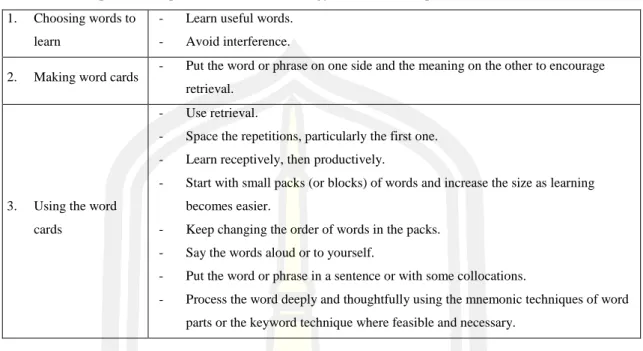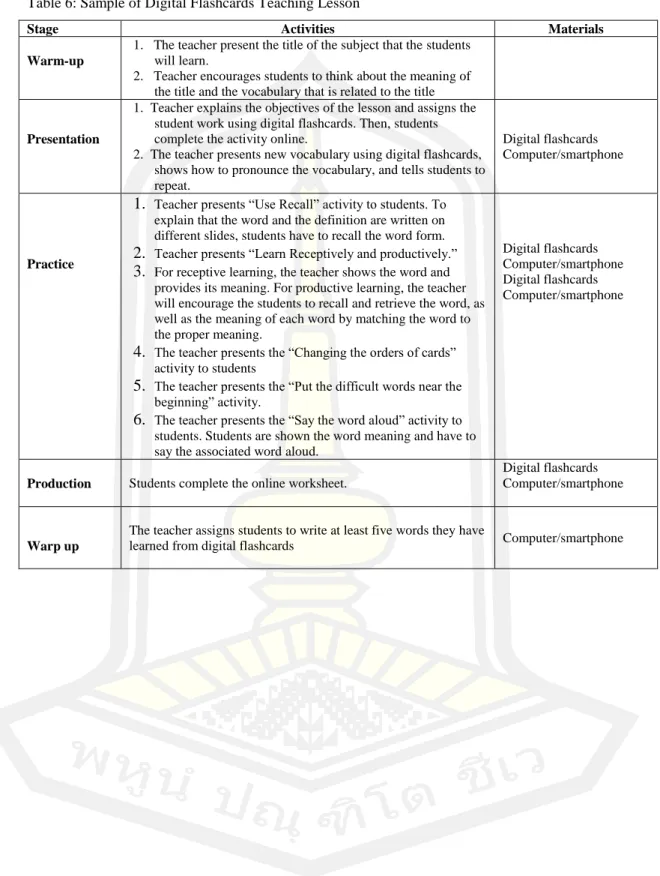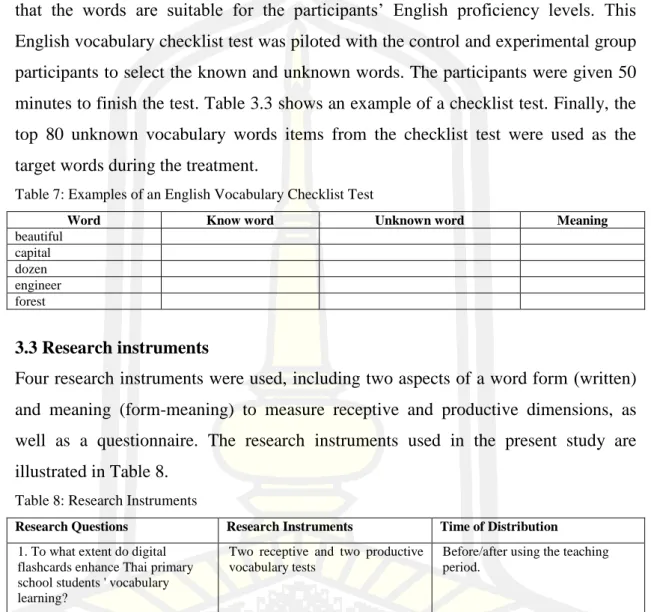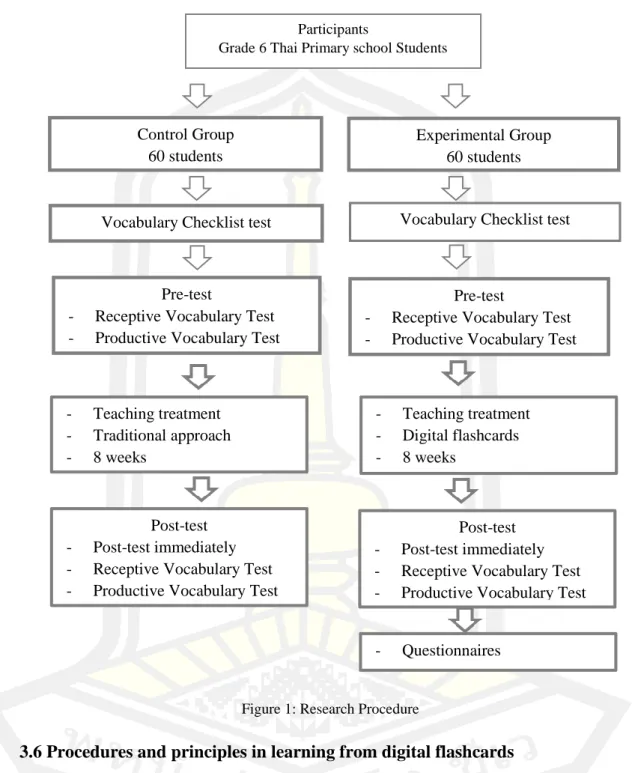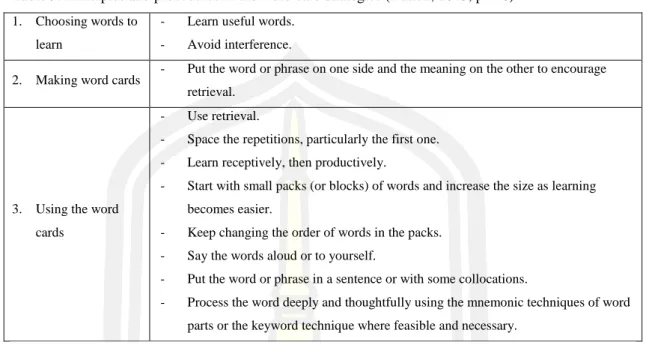These results indicated that digital flashcards were an effective mechanism to facilitate vocabulary learning among Thai primary school learners. These findings reaffirm the effectiveness, visual and audio visuals, and entertainment value of digital flashcards on vocabulary learning.
INTRODUCTION
- Background of the study
- Purposes of the study
- Scope of the study
- Significance of the study
- Definitions of key terms
- Outlines of the thesis
What are Thai EFL grade six primary school students' attitudes towards using digital flashcards to improve vocabulary learning. Finally, the current study will prove the effectiveness of digital flashcards in intentional vocabulary learning and teaching.
LITERATURE REVIEW
Vocabulary Knowledge
When encountering a new word, the learner must understand its meaning, including the context and morphology of the word. As a result, productive knowledge is more in-depth, requiring knowledge of the pronunciation, spelling and pragmatics of a word.
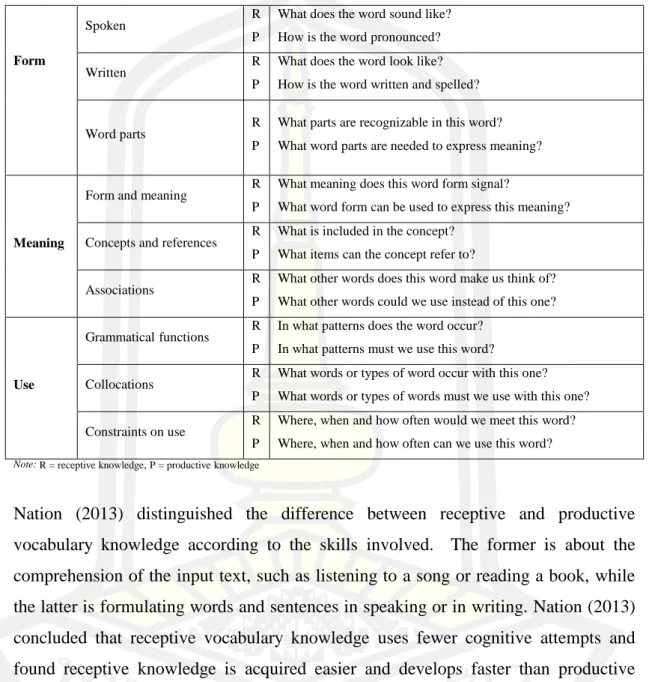
The goals of vocabulary learning
Having receptive vocabulary knowledge means that students can understand the words they hear and the words they read. Receptive vocabulary knowledge is how students retrieve and understand the words when exposed to oral or written input (Nation, 2001).
Vocabulary teaching and learning
- Incidental vocabulary learning
- Intentional vocabulary learning
- Criticisms of Deliberate Vocabulary Learning
- Direct vocabulary teaching
To summarize, the disadvantages of intentional vocabulary learning are that the quality of the words remembered depends on the frequency of use. During PWIM learning, students are shown a picture and asked to identify the items in the picture or to "shake" the words in the picture.
Deliberate vocabulary learning from word cards (flashcards)
- The flashcard strategy
- The benefits of learning from flashcards
The key to using flashcards is to look at the word or picture on one side and see if students remember the answer written on the other side. The meaning of the word translated into the first language or a picture can be added to the card to help students learn the meaning of new words. Make word cards - Put the word or phrase on one side and the meaning on the other to encourage searching.
Both sides of the cards must be printable, one side is the word in the second language and the other side is the meaning in the first language. Flashcards are used for retrieval by allowing students to retrieve the meaning of the word from their memory when they see the second language word on one side of the flashcards; each correct return is the test (Karpicke & Roediger, 2007). There are several guidelines in using the word cards: (1) get instead of know, (2) use the appropriate size of cards, about 15 or 20 words, (3) space the repetitions, ( 4) to repeat words aloud to be absorbed in long - thermal memory, (5) use the technique of deep processing in the creation of words, (6) avoid interference, (7) keep changing the order of words in the package , and (8) use context and common words (Tabrizi & Feiz, 2016).
In summary, there are three steps in using flashcards: (1) choosing words to learn by choosing useful words for students and avoiding distractions; (2) making word cards by putting the word on one side and the Thai meaning on the other side for better searching; (3) use of word cards with regular practice of the word in and after class.
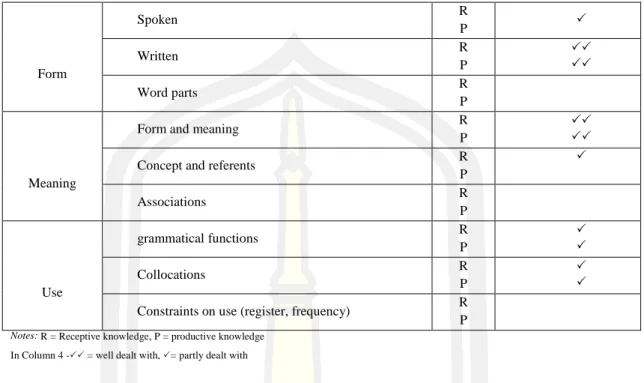
Research and related studies on vocabulary learning and teaching
- Domestic Research
- Foreign Research
In addition, Asabdaftari and Moazaheb (2012) discover three main advantages of digital flashcards: ubiquity, convenience and entertainment for learning new words. Ashcroft and Imrie (2013) confirmed that digital flashcard media such as Quizlet program provide the opportunity to redefine the word learning experience in which the students can share and interact with their classmates during the exercise, thus making it more fun for young students to learn the words;. The challenges of using digital flashcards in the classroom depend on L2 ages and graphics' quality (Alnajjar & Brick, 2017).
Regarding students' perception of digital postcards, they prefer to use digital postcards over paper postcards (Basoglu & Akdemir, 2010; Yuksel et al., 2020) due to their efficiency, pervasiveness and entertainment value. However, the effective use of flashcards in the classroom depends on the age of the L2 and the quality of the graphics (Alnajjar . & Brick, 2017). Hsui-Ting Hung (2015) mentions in the study that students' knowledge of vocabulary is advanced with the use of purposeful vocabulary learning with the use of digital flashcards.
From the review, many researchers agree that deliberate spaced repetition learning using digital flashcards seems to be an effective and interesting way to learn the language.
Summary of the current study
RESEARCH METHODS
- Participants and setting
- Research design
- Selecting the target words for the study
- Research instruments
- The receptive word meaning (L2 Translation Test)
- The productive word meaning (L1 Translation Test)
- The receptive word form (vocabulary knowledge of spelling)
- The productive word form (spelling L2 cloze test)
- Students’ attitudes questionnaire
- Establishing the test reliability and validity
- Data collection procedure
- Procedures and principles in learning from digital flashcards
- Data Analysis
- Summary
The questionnaire was used to explore students' attitudes towards the use of flashcards (DF) to improve vocabulary knowledge, including the advantages and disadvantages of this method (Fredericks, Blumenfeld, & Paris, 2004). This further supports the positive effect of digital flashcards on vocabulary learning and development among Thai primary school students in productive form meaning knowledge. This further supports the positive effect of digital flashcards on vocabulary learning and development among Thai primary school students in productive form spelling knowledge.
Overall, this study shows that the use of digital flashcards improved vocabulary knowledge among Thai primary school students. The questionnaire was used to explore students' perceptions of the use of digital flashcards to improve vocabulary knowledge. The analysis of the current results revealed the significant effects of digital flashcards on vocabulary knowledge among Thai primary school students.
In conclusion, the present study confirms the significant benefits of digital flashcards in vocabulary learning.
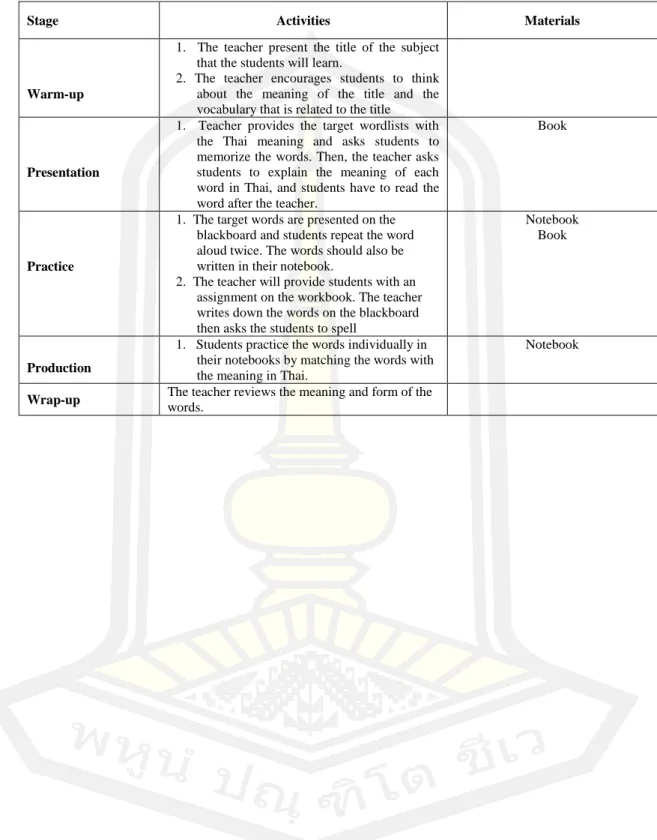
RESULTS
Receptive vocabulary knowledge results
- Receptive word meaning (L2 Translation Test)
- Receptive word form (vocabulary knowledge of spelling)
It was worth noting that there was no significant difference in the pre-test performance between the two groups (t-test = 0.00, p-value = 1.000). However, the analysis revealed a significant difference in the post-test performance between the control and the experimental groups (t-test = 17.38, p-value . = 0.000). In contrast, there was a significant difference in the post-test performance between the experimental (𝑥̅=13.25) and control groups (𝑥̅=11.00).
It can be concluded that the current study provided evidence that digital flashcards improved vocabulary learning and development among Thai primary school students in receptive form-meaning knowledge. It was worth noting that there was no significant difference in pretest performance between the two groups (t-test = 1.95, p-value = 0.053). However, the analysis revealed a significant difference in posttest performance between the control and experimental groups (t-test = 12.74, p-value = 0.000).
This further supports the positive effect of digital flashcards on vocabulary learning and development among Thai primary school students on receptive form spelling knowledge.

Productive vocabulary knowledge results
- Productive word meaning (The L1 Translation Test)
- Productive word form (spelling L2 cloze test)
These findings indicated a significant increase in knowledge of productive-meaningful form connections over time. Both groups revealed little difference in pre-test performance between groups (Experimental group = 𝑥̅=8.75; Control group= control groups (𝑥̅=11.00). Overall, the analysis showed that the experimental group students performed higher than the counterparts of the control group.
It was worth noting that there was no significant difference in the pretest performance between the two groups (t-test = 1.67, p-value = 0.098). However, the analysis revealed a significant difference in the posttest performance between the control group and the experimental group (t-test = 9.25, p-value = 0.000). These findings indicate a significant increase in knowledge of productive connections between form and spelling over time.
Both groups showed that there was little difference in pre-test performance (experimental group, 𝑥̅=9.00; control group, 𝑥̅=8.75); however, the experimental group significantly outperformed the control group in posttest performance (experimental group, 𝑥̅=11.75; control group, 𝑥̅=10.25).

Summary of overall performance
The findings also demonstrated the developmental continuum of vocabulary learning following the digital flashcard intervention. Furthermore, the current findings showed that Thai primary school students acquired aspects of vocabulary knowledge differently in each skill. More precisely, the results showed that Thai primary school participants tended to acquire word form meaning (L2TT) before word form spelling (vocabulary spelling).
Both groups of participants gained more knowledge of English vocabulary; however, experimental group participants improved significantly and weighed more than control group participants.
Students’ perceptions toward using digital flashcards instruction
In summary, the current findings suggest that eight weeks of digital flashcard intervention improved students' vocabulary knowledge. The account of the significant increase in vocabulary knowledge through digital flashcards is the result of the effectiveness of intentional vocabulary learning. In conclusion, the current study confirms the effectiveness of digital flashcards for vocabulary learning and teaching.
Another explanation for the high satisfaction with digital flashcards could be that the flashcards quickly accelerate students' vocabulary knowledge. The main objective of this study was to investigate the effect of digital flashcards on improving vocabulary learning among Thai primary school students. Specifically, this study demonstrated the effectiveness of digital flashcards in facilitating vocabulary learning and teaching.
The aim of this questionnaire is to explore students' attitudes towards the use of flashcards to enhance vocabulary learning.
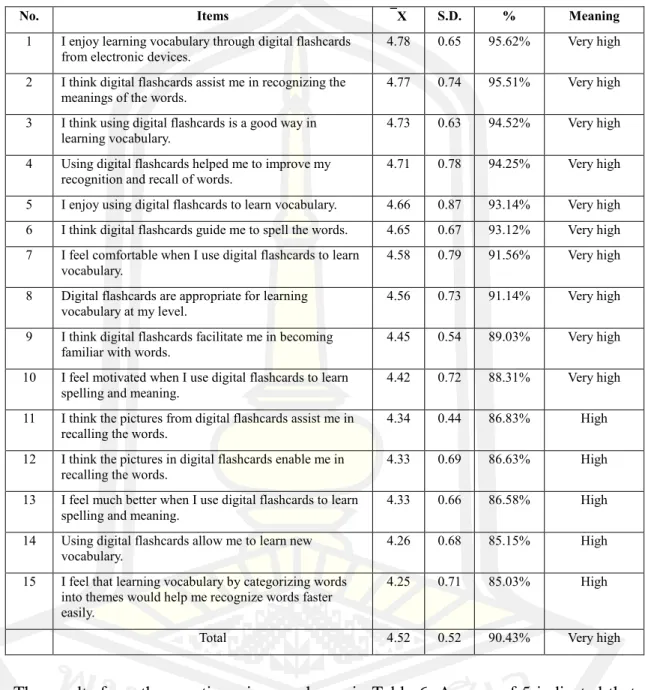
DISCUSSION AND CONCLUSION
The effect of digital flashcards on the form-meaning link of English vocabulary
The result also suggests that retention rates for intentional vocabulary learning are higher than those obtained with. Another explanation for the development of vocabulary knowledge could be based on Schmidt's (2010) brand hypothesis, which indicates that vision is the necessary condition for vocabulary learning in the second language. As applied to vocabulary activities using digital flashcards, primary school participants should consciously notice L2 features or features of the target words in the input activities and purposefully attend to form-meaning links of lexical items to optimize their learning.
The acquisition of knowledge about the form and meaning of target words could be explained by intentional learning of vocabulary input, which allows learners to practice form-to-meaning and meaning-to-form recall in repeated recall of target words. In this regard, guided conscious vocabulary learning through digital flashcards facilitates students' L2 vocabulary recall and recall. While the process of observation directs or leads to the learning of L2 words, recall reinforces the meaning of a particular word in the learner's mind.
This suggests that the more frequent the search for a specific lexical unit is in the learning process, the greater the chance that the target word will be more deeply embedded in the learner's memory.
Thai EFL primary school students’ attitude about using digital flashcards
Conclusion of the study
Implications of the study
Limitations of the study
Suggestions for further studies
Using computer-assisted vocabulary learning tools in English language teaching: Exploring in-service teachers' perceptions of the usability of digital flashcards. The impact of two instructional techniques on EFL learners' vocabulary knowledge: flash card versus word list instruction. Using electronic flashcards to enhance Mathayomsuksa 2 students' vocabulary learning. Master of Arts Thesis in English, Graduate School, Khon Kaen University.
English vocabulary learning with word lists, flashcards, and computers: implications from cognitive psychology research for optimal distance learning. The relationship between receptive and productive affix knowledge and vocabulary size in an EFL context. The effect of teaching vocabulary strategies on Thai university students' word retention in the second language classroom.
Vocabulary learning strategies used by Thai high school students in science, language, and English programs.
Receptive word meaning (The L2 Translation Test)
Productive word meaning (The L1 Translation Test)
Receptive word form (vocabulary knowledge of spelling)
Productive word form (spelling L2 cloze test)
Questionnaire (Students’ attitudes on using digital flashcards in
12 I believe that learning vocabulary by categorizing words into themes would help me recognize words more quickly and easily.
